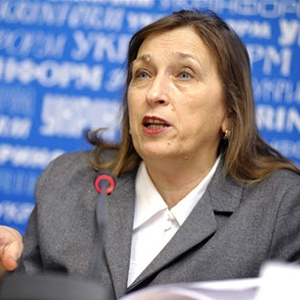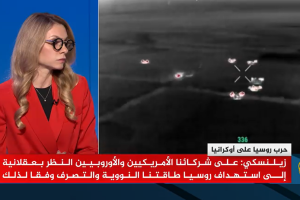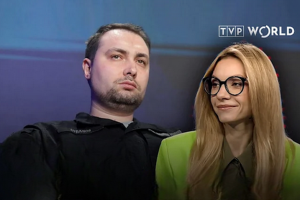An alarming signal: instead of a fight against corruption the ruling power is starting a fight against corruption fighters
Iryna Bekeshkina sociologist, Director of the Ilko Kucheriv Democratic Initiatives Foundation | On March 23 the Verkhovna Rada approved in its entirety a presidential bill No. 172 “On Amendments to Article 3 of the Law of Ukraine On the Prevention of Corruption”. In the variant submitted by the President the essence was the exemption of contracted military servicemen and mobilized soldiers from obligations to fill out electronic declarations. However, in addition to the aforementioned bill an amendment proposed by people’s deputy (People’s Front) Tetyana Chornovil, according to which electronic proprietary declarations in the form envisaged for state public officials must also be submitted by representatives of anti-corruption organizations, was approved. As stated in the Law, anti-corruption organizations included those which “are managers or are part of their senior management, other bodies of management of nongovernment organizations, other non-entrepreneurial companies which are engaged in counteracting corruption, implementation of standards in the sphere of anti-corruption policy, monitoring of the anti-corruption policy of Ukraine, drafting of proposals on issues of formation and realization such a policy and/or take part in and are engaged in taking measures related to the prevention or counteraction of corruption”. |
What could the approval of this provision imply? What dangers lie in this provision?
First of all, it is noted that similar appendices to the “Law on the Prevention of Corruption” are legally ignorant seeing as corruption by definition relates to officials of the civil service. The Law of Ukraine “On the Principles of the Prevention of and Fight Against Corruption” succinctly defines corruption as “abuse of official authorities by a person and taking advantage of possibilities related to this with the aim of receiving illegal benefits”. Furthermore, in this law the categories of individuals who are subject of responsibility for illegal acts of corruption are envisaged. Civil activists are not on this list, which is understood seeing as they are employed by the civil service.
Why did deputies violate the law to a certain degree?
The first most obvious reason is revenge. It is non-government organizations, first and foremost those engaged in anti-corruption, which achieved their goal of the approval of the law on electronic declarations in its current form. As a result, society was shocked by the wealth that government officials had earned, including that of deputies who had never been involved in business. However, so far not a single one of the obvious corrupt officials bore any responsibility and the accordant investigations were never launched. Instead, the structures of the ruling power are trying to subordinate anti-corruption bodies, the independence of which those very same non-government organizations are trying to achieve.
Hence, the maximum number of obstacles were put up against the work of non-government anti-corruption organizations and then in turn they were discredited when the opportunity arose.
First and foremost, it must be noted that the provision on organizations that are required to fill out declarations is not very clearly written. And this in turn raises a number of questions: What organizations are they? Are they those whose anti-corruption activity is written in their Statute? Are they those that from time to time are engaged as partners in executing anti-corruption projects? The absence of succinct criteria opens up room for taking a random approach on the part of law enforcement bodies and the persecution of any contentious organizations and non-government activists.
The provision requiring individuals that are engaged in taking measures associated with the prevention or counteraction of corruption should fill out electronic declarations is even less clear. Of course, this provision cuts off anti-corruption organizations from offering certain services, for example, sociological firms that often receive orders to conduct public opinion polls on the topic of corruption or the owners of premises on which public events are conducted or publishers of literature or even the suppliers of office supplies for anti-corruption organizations can refuse to cooperate due to their unwillingness to have to deal with filling out declarations. By the same token, the activity of anti-corruption organizations can simply be paralyzed.
This norm of the Law is essentially targeted against those public activists and organizations that are on the frontline of the fight against corruption.
Not only Ukrainian public (non-government) activists have already expressed their attitudes (see the Statement of the Revitalization Reform Package) - http://rpr.org.ua/news/vlada-zaprovadzhuje-kryminalnu-vidpovidalnist-dlya-uchasnykiv-mitynhiv-proty-koruptsiji-zaklykajemo-prezydenta-ne-dopustyty-avtorytaryzmu/), and our international partners from the European Union and the embassies of the U.S., Great Britain and Canada.
The question lies in herein – is a similar decision of the Verkhovna Rada a consequence of the emotional attitudes of deputies towards anti-corruption organizations and their leaders or is this testimony a targeted policy of the ruling authority, which is beginning to fold the fight against corruption and, hence, take on itself the task of fighting those that are the most fervent fighters against corruption?
The answer to this question will become clear in the foreseeable future. In the opinions of experts, there is only one way out of this situation. The President must veto this bill with proposals attached and return it to the Parliament for consideration. If the President signs this Law in its current form, this will imply a very serious turn of state policy in the direction of folding the fight against corruption and corrupt officials and the start of a battle with civil society.









